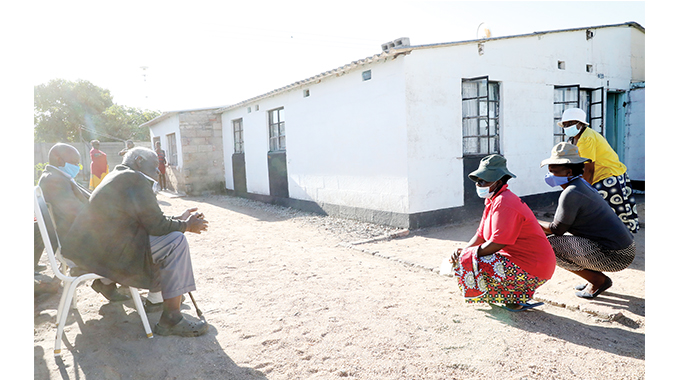When death flows through the pipes; the story of Bulawayo’s water crisis

Yoliswa Dube-Moyo
TEARS started rolling down NaAndile’s cheeks before she could begin talking about the circumstances surrounding her brother’s death a few days earlier.
She shut her eyes momentarily as she softly sniffled, while trying to piece words together.
NaAndile cupped her face in her hands, seemingly rounding up the courage to speak.
But, still, she failed as she was overcome by the grief of losing her brother who had died following a bout of diarrhoea after drinking contaminated tap water while visiting her at her Old Luveve lodgings in the city.
The tension in the room was so thick, you could cut through it with a knife.
A can of worms had been opened by virtue of bringing up the city’s water troubles.
“I’m still mourning my brother and I still find it hard to talk about him without shedding a tear. I’m so heartbroken by the way he died. We buried him a couple of days ago and it’s still very hard for me,” NaAndile, who later identified herself as Ms Nolwazi Moyo, eventually said.
Her brother Blessing, she said, had been to her lodgings for the weekend and started complaining of a running tummy after drinking water which had just started flowing through the taps following several days of the Bulawayo City Council’s scheduled water rationing.
“We all drank the water but fell sick at different intervals. We thought it was just a regular stomach bug but my brother wasn’t getting any better. We thought it best to seek some medical attention. After a visit to the clinic, he was given some tablets and rehydration sachets but still, there was no improvement. We decided to take him to the hospital where he was treated for a few days but sadly, he didn’t make it,” said NaAndile who still could not come to terms with the manner in which her brother had died.
The circumstances are still surreal to her. His death could have been avoided, she believes.
“It just seemed like a regular stomach ache but it’s still shocking how his condition deteriorated leading to his death,” said NaAndile, using a cloth wrap to wipe off tears from her face.
Bulawayo is facing a water crisis that has forced the city council to introduce a weekly 144-hour water shedding programme.
Droughts due to climate change have been blamed for the insignificant inflows in the city’s supply dams for years, prompting council to decommission three of the six supply dams over the past few months.
But to NaAndile and her family, the city’s incompetence and failure to supply clean water to residents is to blame for the death of her brother.
“You don’t know how it’s like losing a loved one to a disease that can be prevented. Now we have so many questions that no one will ever be able to answer. Even if they do, it will not bring my brother back,” said NaAndile.
Her neighbour, Mr Nobert Sibanda is lucky he did not lose his two daughters who also fell sick after drinking contaminated tap water.
“There’s nothing as difficult as nursing sick children during these tough times. We’re not working and don’t readily have money to be taking care of medical bills,” said Mr Sibanda who is grateful his daughters have since made a full recovery.
He said his girls, aged nine and 18, had been sick for about two weeks because of the dirty tap water.
“There was never any thought put into drinking water. There was also no reason to think drinking our water, which we usually did with no issues, would be problematic. To my surprise, my daughters started complaining of stomach ache after drinking water. We thought we could sit it out and it would pass but after a few days I realised they were only getting worse so we decided to rush them to the clinic for treatment.
Thankfully, they responded well to treatment and got better,” said Mr Sibanda, a former kombi driver.
He said due to the Covid-19 induced lockdown, money was hard to come by as kombis are not allowed to operate.
“We’re stretched and really can’t afford to be having sick children. Council needs to do something about this water crisis before more people lose their lives,” said Mr Sibanda.
The Government recently revealed that human waste was found in water that was supplied to Luveve suburb which resulted in the outbreak of typhoid and dysentery that had killed 17 people by yesterday afternoon in the suburb.
About 1 798 cases have been confirmed with the majority of those that have been affected being in the five to 20-years-old age group.
In New Luveve, the Thwala family had just laid wreaths on the grave of their daughter, Gladys, who also fell sick after drinking contaminated water.
Her 15-month-old son has yet to learn that his mother is no more while her eldest son who is 12 has yet to understand what it really means knowing that his mother is dead.
“We were all sick. My brother is actually in the house sleeping, he’s still sick. I’m not strong yet myself. Unfortunately, my sister didn’t make it,” said Mr Robert Thwala, still visibly shaken by his sister’s death.
He said his sister had been admitted to Mpilo Central Hospital but unfortunately died a few hours after admission.
“My brother had also been taken into hospital but he wasn’t getting the medical attention he needed. He was at the hospital for a few days and I couldn’t even go and visit him because I was also sick. He was discharged from hospital despite the fact that he was still unwell,” said Mr Thwala.
He continued: “My sister died a few hours after admission yet the hospital only told us of her passing a few days later. When I went to identify her body at the mortuary, she even still had a cannula on her arm.
They probably tried everything they could but it was too late.
She had grown really thin. I too have lost a lot of weight as a result of the diarrhoea.”
Mr Thwala said it was unfortunate that council did not have an immediate solution to the water problem in the city.
“How many more families must bury their loved ones before they do something? This water is unsafe to drink; people are always complaining about stomach problems every other day. We need a solution, not more dead bodies,” he charged.
Luveve suburb has been exempted from water rationing to help manage the outbreak but this has done nothing to calm the fears of residents who still have to drink the water.
The local authority has reported that it requires US$1 482 000 to address the problem of water contamination in the affected areas. The plan of action according to the local authority’s engineering services department includes the rehabilitation of the existing water and sewer infrastructure with the local authority noting that one of the possible causes of the contamination was the obsolete infrastructure.
“The infrastructure is over 50 years old and has not had any water quality challenges. The 144-hour shedding strained the already aged network, further complicating the system and reducing its ability to self-cleanse due to prolonged hours of no water in the network.
“Part of Old Luveve water mains are being replaced under BWSSIP (Bulawayo Water and Sewerage Services Improvement Project) which is an African Development Bank (AfDB) on-going project, to eliminate such challenges. The water connections are being separated and repositioned to run front-verge, while the sewer drainage will remain mid-block. However, funding has not been adequate to cover the whole of Old Luveve,” reads a council report on the contamination.
The targeted projects include; rehabilitation of the outfall sewer line with hand dug wells (US$1,2 million), repair of all water and sewer service connections (US$250 000), pipe laying and replacement (US$25 000), repair of the reclaimed line (US$5 000) and pipes and fittings (US$ 2 000).In the meantime, residents are encouraged to boil water before drinking it. – @Yolisswa








Comments